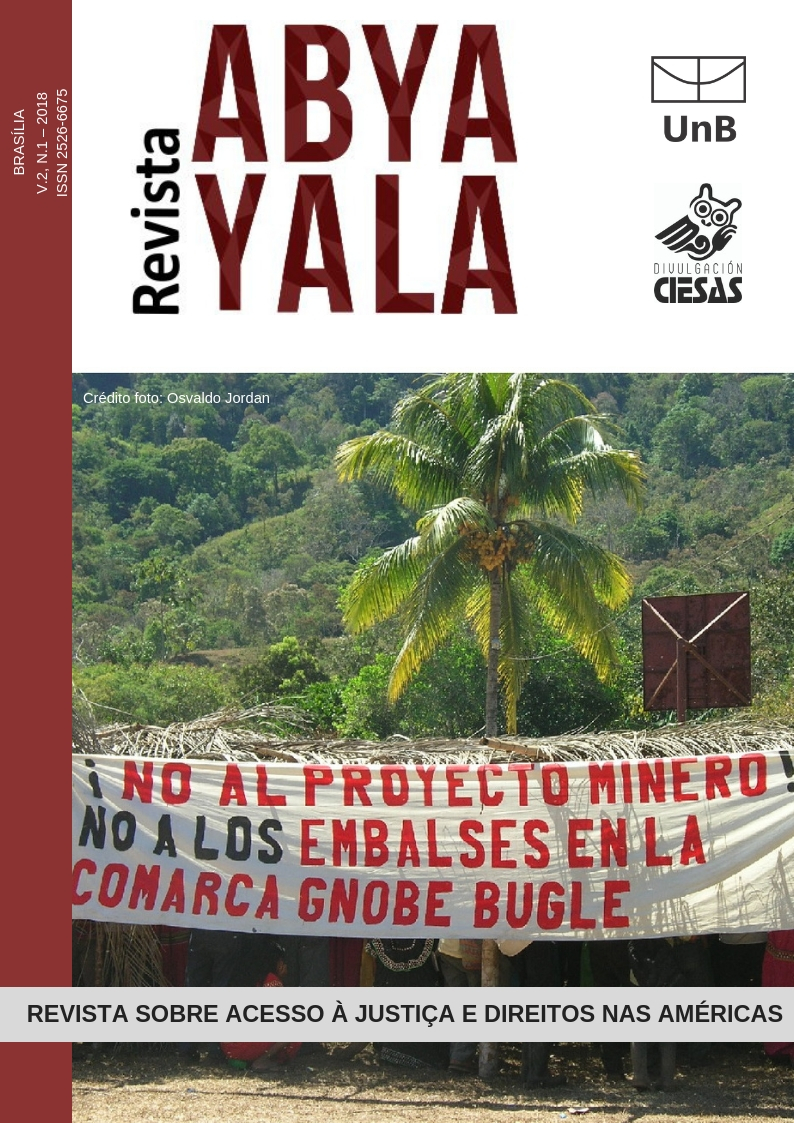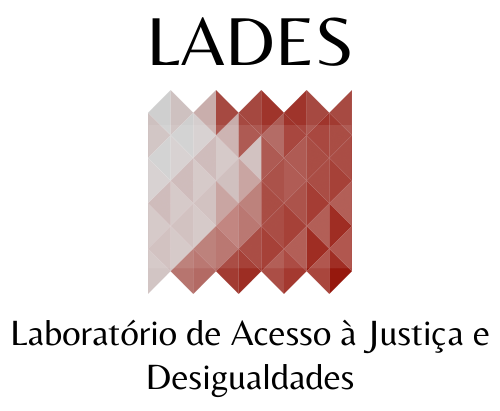Between support and marginalization
The process of the Diaguita’s re-emergence in the age of neoliberal multiculturalism (Chile)
DOI:
https://doi.org/10.26512/abyayala.v2i1.10697Palavras-chave:
neoliberal multiculturalism, extractivism, indigenity, corporate social responsibility, Chile, Pascua LamaResumo
Long regarded as an ethnic group extinct since the 16th century, the Diaguita of Chile re-emerged as an indigenous people in the early 2000s in the midst of their struggle against extractivism. Although they did not „exist”Ÿ 15 years ago in legal terms and were socially invisible, they are now the third most important indigenous group in Chile, after the Mapuche and the Aymara. This paper analyses the combined roles of a Canadian mining company (Barrick Gold, Pascua Lama project) and the Chilean state in the process of this group”Ÿs re-emergence in the Huasco Alto region of northern Chile. In particular, it shows how the social responsibility programs of the mining company (CSR), set up to support “the ethnic revitalization” of the Diaguita, contribute both to divide local indigenous communities and to justify a culturalized and depoliticized indigenous identity, compatible with mining interests and the state's project to conciliate neoliberal and multiculturalist policies.
Downloads
Referências
AMPUERO, Gonzalo. « Diaguitas chilenos del pasado y del presente ». In: SOCIEDAD DE CREACIONES Y ACCIONES LITERARIAS. Culturas Surandinas. Huarpes y Diaguitas [Actas del Congreso Binacional “Raices de Etnicidad. Región de Coquimbo-Provincia de San Juan”]. La Serena: Arturo Volantines, 2011, pp. 175-189.
ANAYA, James. Informe del Relator Especial sobre la situación de los derechos humanos y las libertades fundamentales de los indígenas. La situación de los pueblos indígenas en Chile: seguimiento a las recomandaciones hechas por el relator especial anterior. New York: United Nations, Human Rights Council, 2009.
ANAYA, James. Rapport du Rapporteur spécial sur les droits des peuples autochtones. Industrie extractive et peuples autochtones. New York, Geneva: United Nations, Human Rights Council, 2013.
ARAVENA REYES, Andrea. « Identidad indígena en Chile en contexto de migración, urbanización y globalización », Cahiers ALHIM [online], n. 27. 2014. http://alhim.revues.org/4942
AYLWIN, José. Implementación y jurisprudencia nacional relativa a los derechos de los pueblos indígenas: la experiencia de Chile. Documento de trabajo n°3. Temuco: Observatorio de derechos de los pueblos indígenas, 2005.
BABADZAN, Alain. « Les tribus du néolibéralisme », L’Homme, vol. 3, n. 207-208, pp. 349-365, 2013.
BACHELET, Michelle. Discurso sobre la incorporación del pueblo diaguita a la ley indígena, Santiago de Chile, Palacio de la Moneda, 2006, August 28. Retrieved on August 31, 2006 from:
BAEZA, Cecilia. « Multiculturalisme et construction identitaire au Chili (1990-2011) », Critique internationale, n. 54, pp. 119-43, 2012.
BARRRERA-HERNANDEZ, Lila, 2005. « Indigenous Peoles, Human Rights and Natural Resource Development: Chile's Mapuche Peoples and the Right to Water », Annual Survey of International & Comparative Law, vol. 11, n. 1 : Article 2, 2005.
BARRICK. Etnia Diaguita. Santiago: Compañía Minera Nevada Ltda, 2007.
BARRICK. Reporte de Responsabilidad Sudamérica 2008. Santiago: Barrick, 2009
BARRICK. Reporte de Responsabilidad Chile 2011. Santiago: Barrick, 2012.
BARTH, Friedrich. « Les groupes ethniques et leurs frontières. ». In: POUTIGNAT, Philippe and STREIFF-FENART, Jocelyne (dir.), Théories de l’ethnicité. Paris: Presses Universitaires de France. 1995 [1969].
BOCCARA, Guillaume. « Cet obscur objet du désir… multiculturel (III) : ethnogenèse, ethnicisation et ethnification. Discussions autour de El regreso de lo indígena », Nuevo Mundo Mundos Nuevos [online], 2010. www.nuevomundo.revues.org/59984
BOCCARA, Guillaume. « Le gouvernement des “autres”. Sur le multiculturalisme néolibéral en Amérique Latine », Actuel Marx, vol. 2, n. 50, pp. 191-296, 2011.
BOCCARA, Guillaume and AYALA, Patricia. « Patrimonializar al indígena. Imaginación del multiculturalismo neoliberal en Chile », Cahiers des Amériques Latines, n. 67, pp. 207-27, 2012.
BOCCARA, Guillaume and BOLADOS, Paola. «Dominar a traves de la participación? El neoindigenismo en el Chile de la postdictadura». Memoria Americana, vol. 16, n.2. pp.167-196, 2008.
BOLADOS, Paola. Neoliberalismo multicultural en el Chile democrático: Gubernamentalizando la salud atacemeña a través de la participación y el etnodesarollo [PhD Tesis], Tarapacá: Universidad católica del norte/Universidad de Tarapacá, 2010.
BUDDS, Jessica. « The 1981 Water Code : the impacts of private tradable water rights on peasant and indigenous communities in Northern Chile ». In: ALEXANDER, William (dir.), Lost in the Long Transition: The Struggle for Social Justice in Neoliberal Chile. Lanham: Lexington Books, 2009, pp. 35-56.
BUDDS, Jessica. « Water rights, mining and indigenous groups in Chile’s Atacama ». In: BOELENS, Rutgerd, GETCHES, Davis and GUEVARA-GIL, Armando (dir.), Water Rights, Politics and Identity. UK: Earthscan, 2010, pp. 197-211.
BOULLOSA-JOLY, Maité. « Chronique d’une ethnogenèse annoncée. Histoire des luttes indiennes contemporaines dans le nord-ouest argentin (1970”“2014) ». Problèmes d’Amérique Latine, n. 92, 2015.
CAMPOS MUÑOZ, Luis. « Informe sobre identidad y relaciones interétnicas en el Huasco Alto ». In: MOLINA OTAROLA, Raúl, CAMPOS MUÑOZ, Luis & YAÑEZ, Nancy (Eds.), Diagnostico sociocultural de la etnia diaguita en la III Región de Atacama (Vol.1, tomo III). Santiago: Grupo de investigación TEPU/Secretaría Regional Ministerial de Planificación de la III Región de Atacama, 2005.
CARRUTHERS, David. « Environmental politics in Chile: Legacies of dictatorship and democracy », Third World Quarterly, vol. 22, n. 3, pp. 343-58, 2001.
CASEN - ENCUESTA DE CARACTERIZACIÓN SOCIOECONÓMICA NACIONAL. Pueblos Indígenas. Síntesis de Resultados 2015. Santiago: Gobierno de Chile, July 26, 2017.
COMAROFF, John and COMAROFF Jean. Ethnicity, Inc. Chicago: University of Chicago Press, 2009.
COMPAÑIA MINERA NEVADA SPA-BARRICK, COMUNIDADES INDÃGENAS DIAGUITA and ASOCIACIONES INDÃGENAS DIAGUITA. Memorandum de Entendimiento [online], 2014. Retrieved March 4, 2015 from www.diaguitasdelhuasco.org
COMUNIDAD AGRÃCOLA INDÃGENA DIAGUITA LOS HUASCOALTINOS. Carta de la Comunidad Agrícola Indígena Diaguita Los Huascoaltinos a su Excelencia, Sra. Michelle Bachelet Jeria. Presidenta de la República, 2006. Retrieved March, 4 2015 from www.olca.cl/oca/chile/region03/pascualama/carta_a_presidenta.pdf.
CUENCA, Lucio. « Mapa del despertar comunitario ante la somnolencia autoritaria ». In: Le Monde Diplomatique (dir.), Movilizaciones de Arica a Tierra del Fuego. Mapa de los Conflictos Ambientales. Santiago: Fundación Friedrich Ebert & Editorial Aun creemos en los sueños, pp. 7-17, 2012.
FRENCH HOFFMAN, Jan. Legalizing Identities: Becoming Black or Indian in Brazil's Northeast. Chapel Hill: University of North Carolina Press, 2009.
FOUCAULT, Michel. Naissance de la biopolitique. Cours au Collège de France, 1978-1979. Paris: Gallimard-Le Seuil, 2004.
GAJARDO, Anahy. « Qui de la culture ou de la loi fait l’ethnie ? Esquisse de réflexion en cours sur le processus de (re)connaissance légale des Diaguita ». Tsantsa, n.14, pp. 113-23, 2009.
GROS, Christian and DUMOULIN KERVRAN, David. Le multiculturalisme au "concret": un modèle latino-américain? Paris: Presses Sorbonne Nouvelle, 2011.
HALE, Charles. « Rethinking Indigenous Politics in the Era of the 'Indio Permitido' ». Nacla Report on the Americas. Report on race, part 1, pp. 16-21, 2004.
HALE, Charles. «Neoliberal Multiculturalism: The Remaking of Cultural Rights and Racial Dominance in Central America». POLAR: Political and Legal Anthropology Review 28(1): 10-28, 2005.
HALE, Charles. Más que un Indio (More than an Indian): Racial Ambivalence and Neoliberal Multiculturalism in Guatemala. Santa Fe: School of American Research, 2006.
INSTITUTO NACIONAL DE ESTADISTICAS. Síntesis de Resultados. Santiago: INE, 2012. Retrieved March 4, 2015 from www.censo.cl
INTER-AMERICAN COMMISSION ON HUMAN RIGHTS. Report no 141/09. Petition 415-07. Admissibility. Diaguita Agricultural Communities of the Huasco-Alto, 2009. Retrieved September, 12, 2017 from www.cidh.oas.org/annualrep/2009eng/Chile415.05eng.htm
LATCHAM, Ricardo. Prehistoria de Chile. Santiago de Chile: Imprenta y Litografía Universo, 1928.
LEHMANN, David (Ed.). The crisis of multiculturalism in Latin America. London: Palgrave Macmillan, 2016.
LI, Fabiana. «Remaking Nature and Mineral Extraction in Chile [ahead of print]». Latin American Perspectives, vol.XX, n.XX, pp.1-18, first published date: June 28, 2017.
MINISTERIO DE BIENES NACIONALES. Ley de comunidades agricolas (Decreto con fuerza de ley n°5). La Serena: Secretaría Regional Ministerial Región de Coquimbo, 1993 [1968].
MINISTERIO DE PLANIFICACIÓN Y COOPERACIÓN (MIDEPLAN). Ley Indígena 19.253, 1993.
MORIN, Françoise. « L’autochtonie comme processus d’ethnogenèse ». In : GAGNÉ, Natacha, THIBAULT, Martin and SALAÜN, Marie (eds.), Autochtones. Vues de France et du Québec. Québec: Presses de l'université Laval, 2009, pp. 54-74.
MOLINA, Raúl. « Identidad diaguita, derechos indígenas y proyectos mineros en El Huasco Alto ». In: YAÑEZ, Nancy and AYLWIN, José (dir.), El gobierno de Lagos, los pueblos indígenas y el “nuevo trato”: las paradojas de la democracia chilena. Santiago, Temuco: LOM Ediciones, Observatorio Derechos de los Pueblos Indígenas, 2007, pp. 391-418.
MOLINA, Raúl. « Diaguitas : Emergencia étnica y dialéctica de las relaciones y conflictos interculturales en el Huasco Alto ». In: DURSTON, John (dir.), Pueblos originarios y sociedad nacional en Chile: La interculturalidad en las practicas sociales. Santiago: PNUD, 2013, pp. 115-127.
MOLINA, Raúl. « Pueblo de Indio Huasco Alto : lugar de memoria y fantasmas de la etnicidad ». In: BIASATTI, Soledad and COMPAÑY, Gonzalo (dir.), Memorias Sujetadas. Hacia una lectura crítica y situada de los procesos de memorialización. Madrid: JAS Arqueología, 2014, pp. 35-52.
MOLINA, Raúl, CAMPOS, Luis, YAÑEZ, Nancy, CORREA, Martín, SINCLAIRE, Carole, CABELLO, Gloria, CAMPOS, Pedro, PIZARRO Iván and ABALLAY, Mario (dir.). Diagnóstico sociocultural de la etnia Diaguita en la III Región de Atacama. Santiago: Grupo de investigación TEPU, Secretaría Regional Ministerial de Planificación de la III Región de Atacama, 2005.
NIEZEN, Ronald. The origins of Indigenism. Human Rights and the Politics of Identity. Berkeley, Los Angeles : University of California Press, 2003.
OLIVERA, Andrea. Devenir Charrúa en Uruguay: una etnografía junto con colectivos urbanos. Montevideo: Lucida Ediciones, Fondation pour l’Université de Lausanne, 2016.
ORTIZ, Miguel. “El poder diaguita : el pueblo que tiene « contra la cuerdas » a tres megaproyectos mineros”. La Segunda [online]. Retrieved on May 24, 2013 from www.lasegunda.com/Noticias/Impreso/2013/05/850025/el-poder-diaguita-el-pueblo-que-tiene-contra-las-cuerdas-a-tres-megaproyectos-mineros
PARK, Yun-Joo and RICHARDS, Patricia. «Negotiating Neoliberal Multiculturalism: Mapuche Workers in the Chilean State». Social Forces, vol. 85, n.3, 2007.
PIZARRO, Iván, CAMPOS, Pedro, MONTERO, Cristina and CAMPUSANO, Rubén. El Valle de los Naturales. Una mirada histórica al pueblo Diaguita Huascoaltino. Santiago: Mosquito Comunicaciones, 2006.
POUTIGNAT, Philippe and STREIFF-FENART, Jocelyne. Théories de l’ethnicité. Paris: PUF, 1995.
RICHARDS, Patricia. Race and the Chilean Miracle. Neoliberalism, Democracy, and Indigenous Rights. Pittsburgh: University of Pittsburgh Press, 2013
ROBIN AZEVEDO, Valérie & SALAZAR-SOLER Carmen (Eds.). El regreso de lo indigena. Retos, problemas y perspectivas. Lima, Cuzco: IFEA-CBC, 2009.
SCHULTE-TENCKHOFF, Isabelle. La question des peuples autochtones. Bruxelles : Bruylant, 1997.
SPEED, Shannon and SIERRA, Maria Teresa. «Critical Perspectives on Human Rights and Multiculturalism in Neoliberal Latin America». PoLAR: Political and Legal Anthropology Review 28(1): 1-9, 2005.
TECKLIN, David, BAUER, Carl and PRIETO, Manuel. « Making environmental law for the market : the emergence, character, and implications of Chile's environmemtal regime », Environmemtal Politics, vol. 20, n. 6 , pp. 879-98, 2011.
YAÑEZ, Nancy. Las implicancias del proyecto minero Pascua Lama desde la perspectiva de los Derechos Indígenas. Temuco: Observatorio de derechos de los pueblos indígenas, 2005.
YAÑEZ, Nancy and MOLINA, Raúl. La gran minería y el derecho de los indígenas en el norte de Chile. Santiago: LOM Ediciones, 2009.
YASHAR, Deborah. 2005. Contesting citizenship in Latin America : the rise of indigenous movements and the postliberal challenge. Cambridge: CUP, 2005.
Downloads
Publicado
Como Citar
Edição
Seção
Licença
Copyright (c) 2018 Abya-yala: Revista sobre Acesso à Justiça e Direitos nas Américas

Este trabalho está licenciado sob uma licença Creative Commons Attribution-NonCommercial 4.0 International License.
O envio de contribuições para Abya Yala implica a cessão de direitos autorais e de publicação à Revista, observando a Atribuição-NãoComercial 4.0 Internacional (CC BY-NC 4.0) adotada.
O conteúdo dos textos submetidos à revista e por ela publicados serão de inteira responsabilidade de seus respectivos autores.
Copyright: https://creativecommons.org/licenses/by-nc/4.0/deed.pt_BR


 Este trabalho está licenciado como Atribuição Não Comercial 4.0 Internacional (CC BY-NC 4.0)
Este trabalho está licenciado como Atribuição Não Comercial 4.0 Internacional (CC BY-NC 4.0) 








